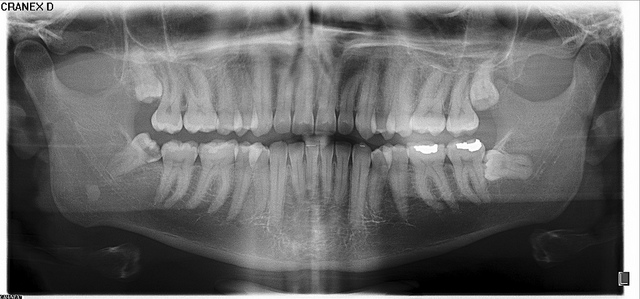Wisdom teeth are the final set of molars that most people get in their late teens or early 20s. Sometimes these teeth (also called third molars) can be a valuable asset to the mouth — that is, if they are healthy and properly aligned.
Unfortunately, these new teeth are often misaligned, which means they are positioned oddly. The teeth may come in horizontally, angle themselves toward or away from the second molars, or sit angled inward or outward. The reason this matters is that poorly aligned third molars can crowd or damage adjacent teeth, the jawbone, and/or nerves. (Fun fact: Did you know not everyone has all four wisdom teeth? If you don’t, it’s genetic. About 10 to 25 percent of Americans of European ancestry are missing at least one wisdom tooth. The numbers are much higher in other ethnic groups.)
Impacted Wisdom Teeth
You may have heard of wisdom teeth becoming “impacted.” That means they break through the gum, but only part way, instead of fully erupting into a normal tooth position. The partial eruption of the these molars allows an opening for bacteria to enter around the tooth and cause an infection, which results in pain, swelling, jaw stiffness, and general illness.
Partially erupted teeth are also more prone to tooth decay and gum disease because they are in a hard-to-reach location; the eruption causes awkward positioning that makes brushing and flossing very difficult.
We often remove wisdom teeth because they can cause these problems. Our team at Klooster Family Dentistry may also recommend removing your wisdom teeth as part of treatment for braces or other dental care.
What to Expect During Wisdom Teeth Removal
Before we decide, we’ll examine your mouth and take an X-ray. Together, you and Dr. Klooster can discuss the best course of treatment. The American Dental Association recommends people have their mouth checked before the age of 20 to see how their third molars are developing. If the wisdom teeth are erupting or are bothering you, a dentist or an oral surgeon can remove the final molars in a single outpatient procedure. We can use general anesthesia and/or local anesthesia to make wisdom teeth removal as comfortable as possible.
Monitoring Your Teeth
Even if your teeth erupted normally, your dentist would continue to monitor them. As people age, they are at greater risk for health problems, and that includes potential problems with their wisdom teeth. Be sure to floss around your wisdom teeth and visit your dentist regularly.
If you have any questions about wisdom teeth or want to schedule an appointment, please contact Klooster Family Dentistry today.

